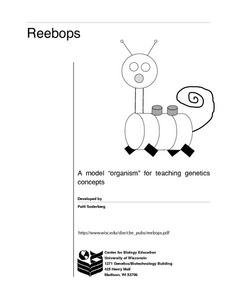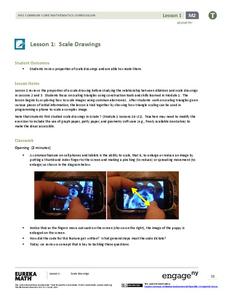Curated OER
Spontaneous Cell Reaction
In this spontaneous cell reaction worksheet, students write equations for these types of reactions and determine the voltage associated with the cell. This worksheet has 4 problems to solve.
Curated OER
The Domino Effect
Students model the transmission of neural impulses with dominoes. In this nervous system instructional activity, students construct a device with dominoes. They use the device to model the way a nerve impulse is propagated from dendrite...
Virginia Department of Education
Prokaryotes
Lead your biology class on a cell-sized adventure! Emerging scientists construct models of prokaryotes, then design an experiment to properly grow a bacterial culture. They conclude the activity by viewing the culture under a microscope....
Curated OER
Muscles and Motor Locomotion
This is a fabulous presentation which should reinforce all aspects of muscle construction on a gross anatomical and micro level. There are slides to help understanding with the muscle fiber anatomy, and many labelled diagrams to...
Curated OER
Reebops a Model "Organism" for Teaching Genetics Concepts
Reebops are cute, marshmallow-based creatures that can be used to teach inheritance. Beginning biologists draw strips of paper that represent chromosomes from two envelopes, one for the father, and one for the mother. Each parent...
NASA
The Electromagnetic Spectrum
Did you realize the visible light spectrum is less than three percent of the electromagnetic spectrum? A hands-onlesson includes five activities and experiments for scholars to explore and discover many advanced science concepts. They...
Biology Corner
Meiosis
Does day one of meiosis in your biology classroom make you wanna split? Get the class off to a great start using this attractive and thoughtfully worded slideshow. In addition to explaining what happens during each step of meiosis,...
Curated OER
Diffusion
Students design and carry out an experiment according to the scientific method. The experiment must test the effects of time and concentration on the rate of diffusion of potassium permanganate into potato cubes. After performing the...
Curated OER
Neuron Cookie
Find out just how enticing learning about neurons can be by creating models with sugar cookies, icing, and candy. With great background information for you and an easy procedure for the kids, studying cells has never been more fun or...
Serendip
DNA Structure, Function and Replication
Before a cell replicates, its DNA must replicate. Take advantage of a hands-on guided lesson plan to teach budding scientists how this happens. Using a set of nucleotide cards, learners become the DNA and work to create matching strands...
DiscoverE
Heart Valve Replacement
Put your heart into it. Scholars design and build replacements for mitral heart valves. Obviously, they can't test their creations on a real heart, so a box with marbles (to represent blood cells) will suffice.
Serendip
DNA
Get up close and personal with DNA! A two-part hands-on activity has learners extract DNA from a small organism and then their own cheek cells. Scholars then explore DNA replication using questions to guide their analyses.
EngageNY
Scale Drawings
Are you searching for a purpose for geometric constructions? Use an engaging approach to explore dilations. Scholars create dilations using a construction method of their choice. As they build their constructed dilation, they...
Curated OER
Representing Data 1: Using Frequency Graphs
Here is a lesson that focuses on the use of frequency graphs to identify a range of measures and makes sense of data in a real-world context as well as constructing frequency graphs given information about the mean, median, and range of...
Serendip
UV, Mutations, and DNA Repair
How effective are cells at repairing UV damage? An inquiry-based lesson has learners experiment with organism by exposing them to various levels of UV light and then examining their DNA after a period of time. Pupils test different...
LABScI
Circuits Lab: Lightbulbs
Electrons flow from negative to positive, but the general consensus is that current flows from positive to negative. Scholars explore current through construction of circuits in both series and parallel. The focus is on voltage,...
Curated OER
Gumdrop Crystal Models
A great way to learn about molecular structures is to make a model. Gumdrops and toothpicks are used to construct crystal models. The models are based on theories of crystal shapes that occur because of positive and or negatively charged...
Curated OER
Exploring Electricity - Four Activities
These are four classic activities used for instructing upper elementary electricians. The first involves experimenting with the Van de Graaff generator. The second is a series of hands-on experiences with static. In the third activity,...
Wyatt Bingham
Comparative Essay: Tips for Timed Writing
This site provides a guideline for writing a comparative essay for the AP World History Test. It also provides practice exercises and samples.
Space Awareness
Coma Cluster of Galaxies
Scientists classify everything from the smallest cells to the largest galaxies, but how do they decide on a classification system? Scholars use 40 pictures of galaxies taken by the Hubble Space Telescope to sort and try creating their...
Curated OER
Maximum Power Point
Pupils investigate how to optimize the power output of a photovoltaic cell using a home-made gnomon stand. They use data collected to create current-voltage and power-voltage curves to determine the "maximum PowerPoint," (MPP) at which...
Curated OER
Mitosis and Meiosis
Students model and differentiate between the processes of mitosis and meiosis. In partners, they use yarn and construction paper to create models for each of the phases of mitosis and meiosis then compare the chromosome numbers in each...
Curated OER
Bridge Design and Bridge Building
Seventh graders conduct an investigation into the design of bridges and their construction. Students design bridges and draw detailed plans. For assessment they construct a model of a bridge that is made entirely of toothpicks. Students...
Curated OER
Matching Flowers With Their Pollinators
Students match flowers to pollinators and construct models of
flowers to demonstrate why different kinds of flowers need different kinds of
pollinators. They use their flower models and the "Scientific Method Format" included in the...























